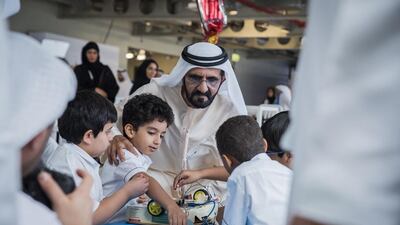The difficulty with innovation is finding a comprehensive definition for the concept. Of course, you can spot breakthrough technology when it is placed in front of you. Just pick up an iPhone and you can feel the clever engineering in your hands. But the role of innovation in society is nuanced and doesn’t manifest itself in one large invention, a trip to outer space or a creative appliance.
Take the UAE, for example. As an economy that grew out of hydrocarbon resources, the transformation to a non-oil economy is a profound journey in innovative thinking in society. Every step towards a knowledge-based economy – whether it be Innovation Week, ambitious new targets for government efficiency, investments in sustainable energy embodied in Masdar or the promotion of science in primary school – is innovation in practice.
On an individual level, the story of Abdalla Alzarooni and the establishment of Emirates Global Aluminium is a demonstration of innovation in daily life. Even the development of shopping applications such as Yebab are a sign of the spirit of ingenuity that often flies under the radar.
So how best to define innovation? Is it the mentality of thinking outside the box? Is it the challenge of accepting that projects might fail but in failure something valuable is learnt for the future? Is it about making government more efficient? Is it the latest smartphone application that can shave five minutes off your daily commute? Or is it all of these things and more?
Of course, it is everything. Innovation is about an openness to change that helps society function better. Such an openness has always been a part of the fabric of Emirati culture and has allowed the UAE to use its bounty of resources and transform the nation into a world leader in trade, aviation and culture.
It is this openness that infuses our people with a creativity to try, to explore, to fail and ultimately to succeed. As long as we maintain this curiosity, innovation will never be absent from society.

